#character motivation
Text
Character motivations for fictional characters
1. Revenge: Seeking vengeance for a past wrong or harm.
2. Power: Craving dominance and control over others.
3. Love and Relationships: Longing for love, companionship, and emotional connection.
4. Redemption: Seeking to atone for past mistakes and find forgiveness.
5. Survival: Striving to stay alive in dangerous or challenging circumstances.
6. Justice: Fighting against injustice and upholding fairness.
7. Exploration: Satisfying curiosity and a desire for discovery.
8. Ambition: Relentlessly pursuing success and achievement.
9. Freedom: Seeking liberation from oppression and constraints.
10. Knowledge and Wisdom: Thirsting for knowledge, understanding, and wisdom.
11. Family: Protecting and nurturing one's family and loved ones.
12. Acceptance: Craving acceptance and validation from others.
13. Friendship: Building and maintaining meaningful friendships.
14. Escape: Seeking to break free from a stifling or undesirable situation.
15. Truth: Uncovering the truth and exposing lies or deceit.
16. Creativity: Expressing oneself and bringing imagination to life.
17. Competition: Striving to be the best and outperform others.
18. Self-Discovery: Embarking on a journey to understand oneself better.
19. Healing: Seeking emotional, physical, or spiritual healing.
20. Faith and Belief: Holding strong religious or spiritual convictions.
21. Mentorship: Guiding and inspiring others to reach their potential.
22. Revolution: Fighting against oppressive systems and advocating for change.
23. Sacrifice: Putting others' needs above one's own and making difficult choices.
24. Fear: Overcoming fears and finding strength in the face of adversity.
25. Fame: Desiring recognition, acclaim, and celebrity status.
26. Identity: Discovering and understanding one's true self.
27. Empathy: Understanding and connecting with others' emotions and experiences.
28. Tradition: Upholding cultural or familial traditions and values.
29. Rebellion: Resisting authority and challenging the status quo.
#writing#writing tips#writer on tumblr#writerscommunity#character development#writer tumblr#writblr#writing advice#oc character#writing help#fictional characters#character motivation#writing ideas#writeblr#writer problems
4K notes
·
View notes
Text
43 character motivations for your fictional characters
To protect their loved ones.
To avenge the death of a loved one.
To save the world/town/community.
To find a lost loved one.
To solve a mystery.
To right a wrong.
To achieve a personal goal.
To gain power or influence.
To find their purpose in life.
To overcome a fear or obstacle.
To learn to trust again.
To forgive themselves or someone else.
To find love or companionship.
To start a new life.
To leave a legacy behind.
To make a difference in the world.
To simply survive.
To gain revenge.
To seek power.
To find redemption.
To follow their dreams.
To escape their past.
To find their true self.
To connect with something larger than themselves.
To understand the world around them.
To experience something new.
To simply have fun.
To make a mistake.
To learn from their mistakes.
To grow as a person.
To become the best version of themselves.
To help others.
To make a difference in the world.
To leave a legacy behind.
To be remembered.
To be loved.
To be happy.
To find peace.
To find hope.
To overcome despair.
To survive.
To thrive.
To live.
Copyright © 2023 by Ren T.
TheWriteAdviceForWriters 2023
#writing tips#thewriteadviceforwriters#on writing#writing#witchcore#how to write#writeblr#writers and poets#creative writing#writers block#character development#character sheet#motivaton#character motivation
3K notes
·
View notes
Note
Hello! How are you? I love your blog, by the way, it's very fun and creative.
Do you by any chance have any ideas on why characters would threaten other characters? Like character A's reasons for threatening character B?
I'm writing a story and I'm kinda stuck on that, even though there seems to be some obvious reasons and motives, but I would love it if you could give some examples!
Please and thank you?
So, as a general rule, specific scenes and characters more generally are driven by their goal/what they want, so a threat will always come down to a desire/want/need for something. The emotions/specifics behind this desire can vary, but ultimately think of a threat as one way for a character to get a thing.
Here is a broad list of motives/driving emotions:
fear (using a threat to get another character to stop doing something, keep quiet about a secret, back off or step aside etc.)
anger (you made me angry, now when I get my hands on you I'll...)
control/punishment (can I make you do what I want with a threat? If you do this, I'll...This can link with any of the other driving emotions, or it can just be ruthless efficiency.)
joy/pleasure (one character's reaction to being threatened simply brings another character joy, one character enjoys being intimidating. Alternatively, I'm bored, so let's mess with you and see how far you can be pushed.)
to maintain face (I'm going to threaten you, because I feel like I can't show weakness/I have a reputation to maintain)
desperation (I don't know how else to get what I need from you, so I'm going to threaten you.)
The other side to always consider, then, is 'how effective is the threat?'
302 notes
·
View notes
Text
Characters care about external stakes. READERS care about internal stakes.
OK. Here's a distinction I've recently started to think about and really notice after reading and watching some things that handle this poorly.
Fiction needs stakes, right? We all agree on that?
Characters have to be doing something, and they need some reason to do things, and there has to be some kind of reward for succeeding or consequence if they fail, yeah?
Cool. So here's the thing about stakes. They can be internal or external.
External stakes are things like: "if we don't do this, the sun will explode" or "if we do this, we'll win the game."
Often, to make things more interesting, external stakes have a ticking clock attached to them. You have to complete your quest before the next full moon or else the spell won't work for another hundred years. You have to score the winning point before the buzzer goes off in five seconds. That tension is important to shuffling the story forward.
But here's the thing.
The reader doesn't give a fuck about the external stakes and the ticking clock. We know perfectly well they're not going to miss the window for the spell or fuck up the finals game. We understand how stories work and how genre conventions work and you're not impressing anyone with your ticking clock.
What readers do actually care about is a character's internal stakes.
Internal stakes are things like "if I can save the world, I can finally absolve myself of guilt for letting my mom die." Or "if I win this game, my crush will finally notice me."
They are personal motivations. They are the reason why your character cares about what they're doing. They are why we care and how we get invested in their story.
Because like. We're humans. At the end of the day, we care about human things and we have human emotions and we relate to people -- even fake people made of scribbles on paper -- who care about stuff the way we care about stuff.
Raising the stakes doesn't mean "make the sun explode if they fail." Raising the stakes means "we care about this person and want to see them succeed."
So why bother with the external conflict and the ticking time clock? If what we actually care about in a story is the person, why can't we just read a couple hundred pages of the character going through therapy and working through their trauma?
Because what that ticking time clock does is it forces a character to act before they're ready. It prevents them from procrastinating. And it makes them do stuff they're not prepared for. And it's thrilling to see them interact with stuff that way, because it forces them out of their comfort zone and into an area where they can grow and challenge their status quo...which is the thing that pushes on those internal conflict bruises.
Imagine that our heroes have as much time as they need to fulfill the prophecy. They can take their time training, studying, making failsafes and backup plans and then go and the plan goes off without a hitch and they save the day without breaking a sweat. That's boring! That's just people going to work. That doesn't force them to confront their inner demons at all! That doesn't rip them from their existing environment and leave them struggling to adapt to new circumstances!
So those external stakes are necessary to keep the plot rolling forward and put pressure on the characters. But ALL OF THAT is only important if that pressure reveals interesting things about those characters, and forces them to engage with the stuff deep inside that they're probably hiding from. Because that's the part that's juicy and interesting for the reader.
Capiche?
627 notes
·
View notes
Text
character motivations:
fear
hurt
survival
failure
being pressured
instability
desire / hunger
guilt
belief they are doing something good
love
loyalty
vengeance / revenge
inequality
unfulfillment
hatred
honour / dishonour
pride
jealousy
death
humiliation
pain
greed
shame
rejection
loss
power
#character motivations#character motivation#writing tips#writerblr#creative writing#writblr#lyralit#writers#writing ideas#writing#writeblr#writing prompts#writers block#prompts#female writers#writing community#motivation#oc#characters
6K notes
·
View notes
Text
"And these are your motives, my lord?"
"Do you think I have others?" said Lord Vetinari. "My motives, as ever, are entirely transparent."
Hughnon reflected that "entirely transparent" meant either that you could see right through them or that you couldn't see them at all.
Terry Pratchett, The Truth
#hughnon ridcully#havelock vetinari#the truth#discworld#terry pratchett#word play#other options#motives#motivation#character motivation#entirely transparent#see right through it
347 notes
·
View notes
Text
Goal, Motivation, Conflict: The Formula for Writing Great Characters
The recipe for creating compelling characters is deceptively simple. All you need is a goal, motivation, and conflict.
These are the building blocks that drive all character development and will ensure you have well-rounded, believable characters every time!
The GMC Formula in a nutshell is:
Goal: What does your character want?
Motivation: Why do they want it?
Conflict: What's stopping them from getting it?
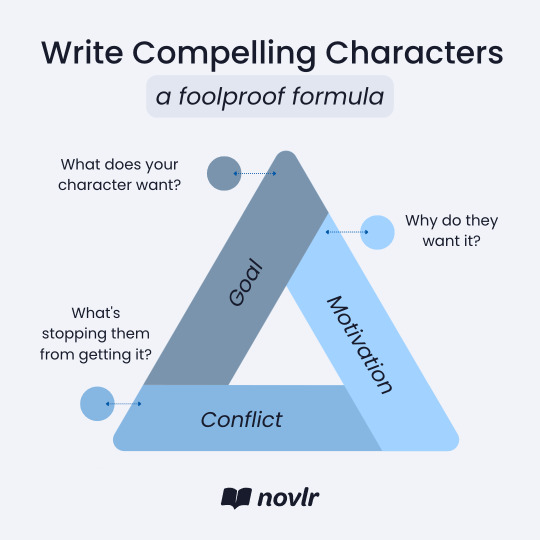
#writers#creative writing#writing#writing community#writers of tumblr#creative writers#writing inspiration#writeblr#writerblr#writing tips#character goals#character motivation#character conflict#writing advice#advice for writers#help for writers#writing tip#writing characters#writing resources#writers corner#goal motivation conflict#character development#writers block#beat writers block
512 notes
·
View notes
Note
Hi! Really love reading your phantom comic so far! If you dont mind I have a question.
What do you think are Tucker's flaws in the comic? Are they more like the ones in the show or no?
Interesting question.
Let's see I wrote on this post from a couple of years ago that Tucker has trouble standing up for himself.
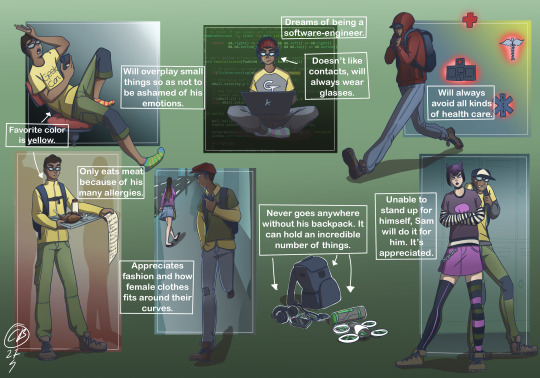
That doesn't mean he has trouble standing up to his friends, especially not Sam whom he knows and trusts. We can see this a couple of times in the comic when he doesn't agree with Sam and tells her off.
He also overreacts and is a bit dramatic when showing his feelings in public. That way he knows what people are talking about and laughing at.
I won't make him a creep like in the show, yes he appreciates women and their fashion. If he acts self-confident in the comic it is to hide that he doesn't know what he is doing.
I hope this answers your question.
211 notes
·
View notes
Text
Can we talk about the climax of The Little Mermaid?
I would like to point another thing out that I noticed on my rewatch.

The ship that Eric uses to shish-kebab Ursula IS the ship that Ariel is exploring in the beginning of the movie.
The ship that she explored instead of going to her musical celebration.
The ship that led her to go to the surface and get yelled at by her dad.
Her dad, who believes she should have let Eric drown because it would be "one less human (spineless savage harpooning fish-eater barbarians) to worry about."
Her dad, who understands at the end of the film that Ariel loves Eric, and was right to do so, because he just saw how Eric saved his daughter in the face of impossible odds and bear certain death, even though she's a mermaid.

It is very important that Eric save the day, USING the ship that symbolized Ariel's belief in the beauty of the human world and willingness to sacrifice and take risks to explore it.
Because it's Eric's heroism that convinces Triton that Ariel's love is as real as her beliefs about humanity. It's no longer a silly teenage girl who's lost her senses about a boy and is too naive to make the right decisions. It's a teenage girl who believed in the possibility that not all humans are barbarians, and some are worth loving--and she was right. And Triton needed to SEE THAT.
If Ariel saves herself, all that would prove to Triton is that she can handle the consequences of her own actions. But if Eric saves Ariel, it proves to Triton that humans can be good and Ariel's choice to love one was real and true.
That is very important. And a pretty amazing way to show it, having Eric stab Ursula with the shipwreck.
#Eric#Ariel#the little mermaid#live action little mermaid#the live action little mermaid#little mermaid remake#little mermaid live action#the little mermaid 2023#Halle Bailey#Jodi benson#Disney#Disney live action remake#the little mermaid appreciation#Disney fan#analysis#meta#film analysis#character motivation
551 notes
·
View notes
Text
The Lost Boys & What Lonelines Does

Anyone who's been an outcast knows the very common fantasy of "another group of outcast who are so cool approch you to join them."
It's why found family is such a popular troupe, everyone wants to belong but not everyone finds it easy. The Lost Boys capture this perfectly.
Michael himself is set up as a classic lonely kid. He's the new kid in town with a brother who's a lot younger than he is. He sees a pretty girl and tries to get to know her, latching on the second she starts to show interest, and then he meets David.
David as a character has this allure too him that even when watching, knowing he was clearly a dangerous person, I could understand why Michael desperately wants his approval. He's cool. He has a pack of friends. He does reckless stuff and people stay away. But most importantly he *wants* Michael to join them. He and the other boys aren't just letting Michael hang around, they're calling his name and encouraging him to be apart of the group.
For Michael, a place to belong is a trap too sweet to resist. And he only really breaks away when Star confesses she was supposed to kill him.
For any writer looking for a motive for their young slasher, I would suggesting keeping loneliness and the desire to belong in mind.
Start slow, and let the lengths your character is willing to go for approval to grow. It makes for a super relatable motive and it made The Lost Boys a really great movie.
#the lost boys#david the lost boys#found family#but dark#writing#character motivation#horror#horror appreciation#lessons from horror films
73 notes
·
View notes
Note
could you please please give more reasons for a whumper to, well, whump? i feel like sometimes my writing is disconnected because they don’t have any realistic motives to do what they do
Sure!
For Security: the whumpee has been overthrown in some way by the whumper, who keeps them under lock and key to prevent them from accumulating power and reclaiming their position.
For Gloating: the whumpee and whumper were bitter rivals. When whumper finally bests whumpee, they keep them around to relive the moment.
For Utility: the whumpee possesses a rare skill, and the whumper kidnaps or imprisons them in order to have access to it. (Bonus points if the whumpee refuses to comply!)
For Punishment: similar to vengeance, the whumpee is deemed villainous or criminal by society, and the whumper(s) feel justified in hurting them. After all, they deserve it, don't they?
For Fun: the whumper is in power over whumpee in some way, and has taken to torturing or tormenting them whenever they get bored.
For Deterrence: the whumpee has broken a rule and must be made an example of.
and as @stabbysheep said,
For Science: the whumper is conducting experiments, either out of curiosity or necessity, and they need the whumpee for the trials. Could be completely legal (maybe whumpee is a criminal, maybe they volunteered not knowing what they were signing up for, maybe they're not human), or not (whumpee is kidnapped to be used as the perfect test subject).
even more reasons
#basically went down the list of motives my whumpers have had#mercury? gloating and security#eimaan? science#peter? fun#everyone in Feyadel? punishment#uriah? fun and utility#hope its helpful hahaha#whump prompts#anon#character motivation
247 notes
·
View notes
Text
The fear behind the manic grin
I know I have a reputation as a feral Vikdecai account (I mean can you blame me?) but all the characters in Lackadaisy are amazing and the main cast all have their own interesting stories playing out
Case in point the musical, poetic and lovably derranged Rocky Rockaby
There is one moment in the pilot where the feral energetic grinning persona slips and we see the face a of a broken young man in a state of total despair, before mercifully Mitzi decides to lighten the tone
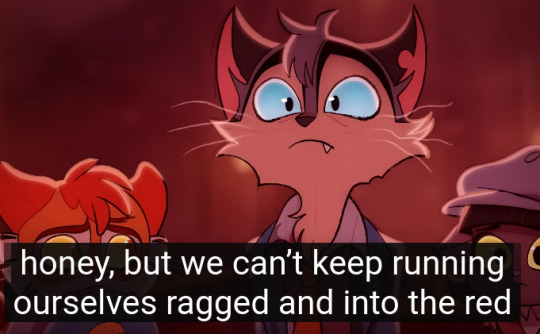


This is key to understanding Rocky and his motivations
After being abandoned by his father and his mothers death from illness, Rocky was raised in his early years for a period of time by his Aunt Nina along with his cousin Calvin (Freckle)
However, due to some as yet unrevealed tragedy, Rocky was ejected from the Mcmurray house and spent the following years riding the rails
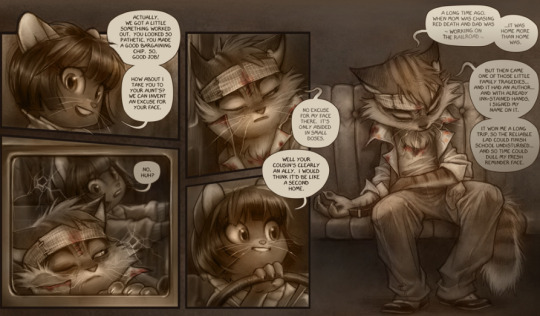
This is what we see the tail end of in the trailer for Season one
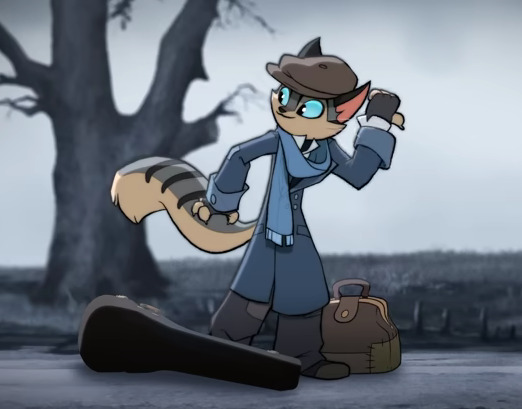
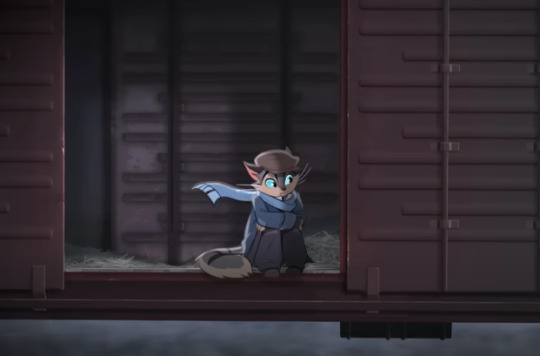
He stayed in touch with Calvin, writing him letters about his adventures, and as you would expect from a flamboyant personality he exaggerates what a big adventure it was how optimistic he was feeling at this time as he travelled from place to place working various assorted odd jobs between 1921 and 1924
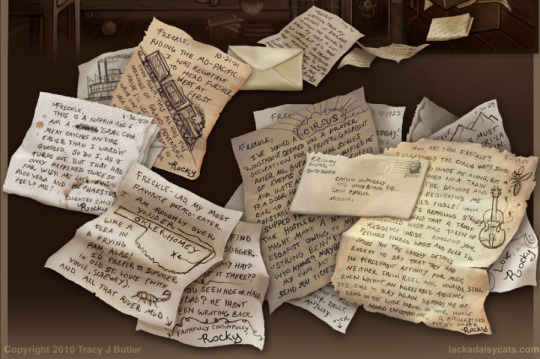
The Lackadaisy Wicki provides a nice breakdown

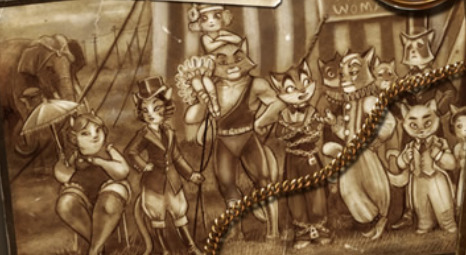
But of course the reality is quite different. Having no home, no family and no friends outside what brief and fleeting acquaintances he made on the road took its toll
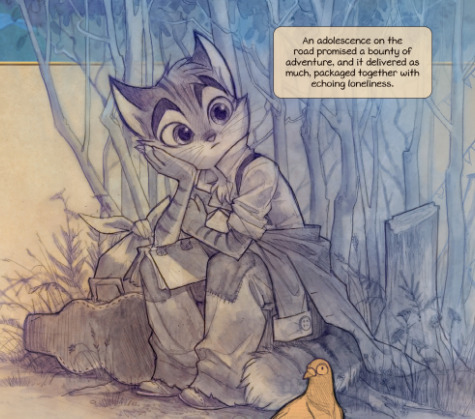
When he finally returns "home" to St Louis he attempts to reconnect with his deadbeat dad only to realize that he had skipped town quite some time ago and once again is not there for him.
Knowing better than to expect a warm welcome from Aunt Nina he is once again all alone with nowhere to go. Simply living on the streets with pidgeons as his only companions


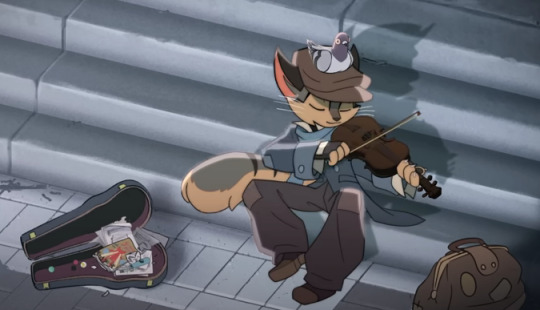
But all that changes when he meets Mitzi May by chance around 1925 while busking in the street with his violin after charming her with his music.
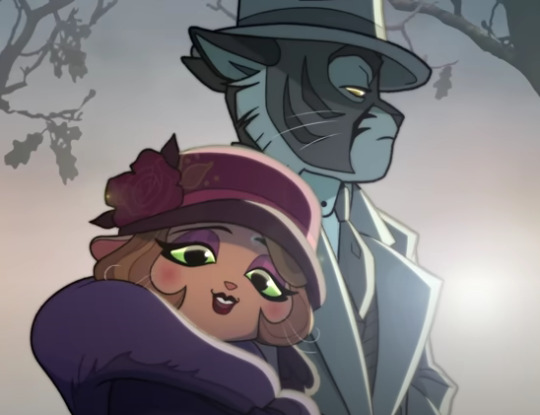
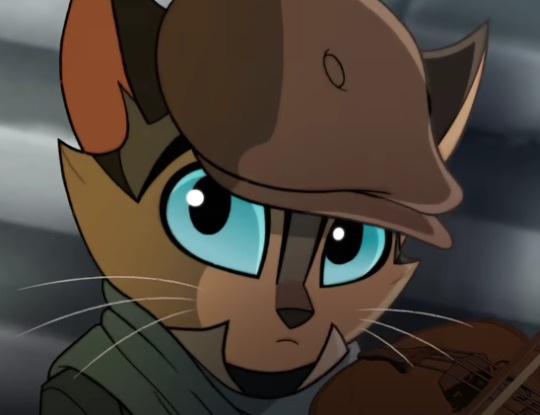
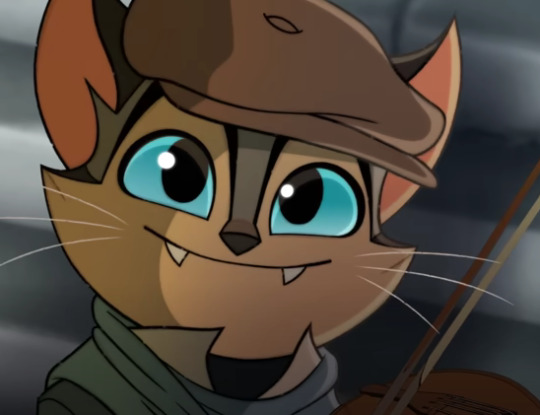
This makes Mitzi his patron, and indeed his saviour from a vagrant existence when she lets him join Zib's band, then playing exclusively at the Lackadaisy speakeasy.
For the first time in years he has not only found somewhere seemingly more long term to be but back in the town he thinks of as home

But even this seemingly positive change does not get to last long. Atlas's death in 1926 throws everything into uncertainty and without its leader and despite Mitzi's best efforts things begin to decline both financially and in terms of manpower.
Those that remain do so for various reasons despite leaving arguably being the smartest option. Rocky does so because he is done with drifting and is determined to hold onto the solid ground he has found no matter what. He makes this desperation clear to Calvin
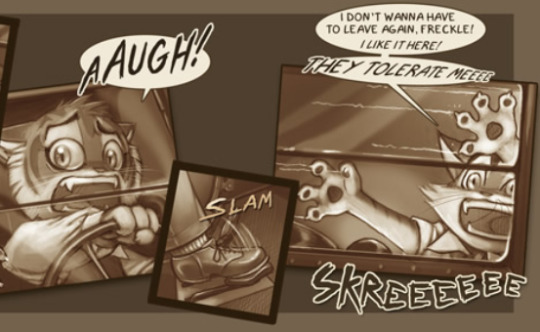
Though it should be noted while he wants the Lackadaisy to be saved he wants it done on very specific terms.
Specifically ones where he is the golden boy that saved the day.
He is desperate to ingratiate himself to Mitzi. This is in part due to gratitude to her as his "saviour", partly him having a crush on her, mostly its tied to his perception of her as a "damsel in distress" that he can ride in and rescue, and in the process secure a permanant place for himself

This is why in both the pilot and the comic he is so devastated when he sees that she is dissapointed with his efforts.

This is also why in both you can see a (barely) passive aggressive attitude towards Wick.
Its not just that he is a rival for Mitzi's affection. The friendly wealthy industrialist, who clearly has a thing for the beautiful widow, threatens to make Rocky and his efforts to be the Knight in shining armour redundant, and equally so Rocky himself.
If he invested his money in the Speakeasy he would be the hero and Rocky would just be the clown that tried so hard (risking his life even) but failed, only for some handsome aristocrat to stroll in with his chequebook
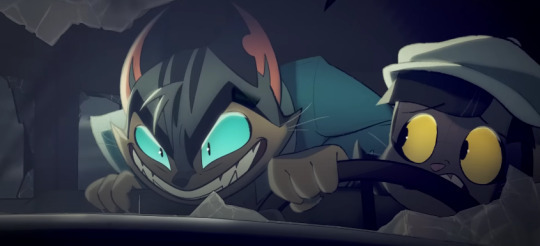
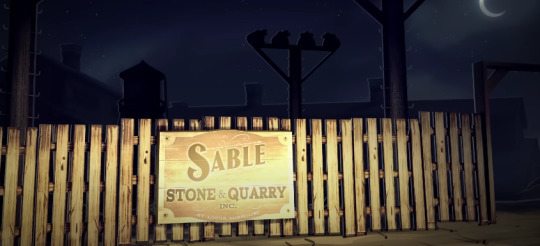

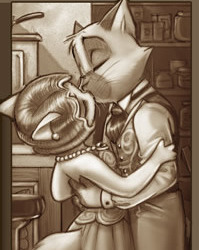

Rocky fears being adrift again. Of feeling alone and unwanted again. He is willing to go to extreme lengths to prevent that from happening.
To feel wanted, included and loved he will start as many fires and thow as much dynamite and dodge was many bullets as it takes

#lackadaisy#lackadaisycats#tracy j butler#rocky rickaby#character motivation#comic#season one#pilot#trailer#1920s#cats#gangsters#prohibition#calvin mcmurray#nina mcmurray#mitzi may#backerkit#freckle#wick sable
104 notes
·
View notes
Text
something i find interesting is how the students in the secret history weren’t sad, or ashamed they killed Bunny. they were guilty because they got caught. the only remorse is “this is what my life could have been if we didn’t kill Bunny” vs. “we killed Bunny and now i feel immense guilt.”
i’m not saying i also wouldn’t have killed Bunny, mans was insufferable fr. but all of their, and (mostly Richards) character motivation was driven by guilt. not by remorse
#dark academia#the secret history#donna tartt#bunny#richard papen#francis abernathy#henry winter#charles macaulay#camilla macaulay#dark academia books#books#character motivation
301 notes
·
View notes
Note
This is such a strange question but why would my character want to save the world when there’s nothing really there for them? I guess what I’m asking is how to develop character motivations for a character who literally has no motivations??? Sorry if this is confusing I’m confused too😭
So, I can think of three approaches here.
1.
Rethink how you are considering motivation. Okay, so there is nothing really there for the protagonist, but do they WANT there to be something?
This leads to potential motivations like, I want someone who loves me (I think saving the world will get me this) or I want the nice life I don't have (and I think saving the world will get me this) etc. I want a sense of purpose/reason to matter (saving the world will give me this.) Or even, saving the world seems like a good way to die, because I don't want to feel like this (like I have nothing) anymore.
Lots of options!
Alternatively, the motivation is a strong morality/they value doing what is right. I won't gain anything saving the world, but I feel compelled to do it anyway for the people who do have something.
2.
Your character is blackmailed/forced into saving the world. This again relies on them wanting something, even if it's just "I don't want to die."
3.
Rethink your protagonist.
If you literally cannot think of a single reason why the protagonist would act or a single thing they want (motivation is want), you may not have the right character for the story you want to tell. (I don't know what your story is about enough to really comment.)
This doesn't mean you have to discard the character. They might work well for another project or alternatively as a character in this project...just not the protagonist.
Always consider who is the best, most interesting person to tell the story you want to tell. Maybe in this instance, if your character is the only one who can save the world for example, your protagonist is another character trying to give them reasons to save the world.
#writing#character building#writing advice#writing tip#character motivation#on writing#writing tips#writer stuff
186 notes
·
View notes
Text
We all know the Big Three elements that keep a story engaging. A character has a goal, which they want to achieve because of some motivation, and while trying to reach it, they run into some conflict.
Notice what’s in the center there?
Yep. Motivation.
It’s crucial, and yet it’s usually the last thing we writers think about. Well, maybe not the VERY last — that could be “hmm, WHAT was this publisher’s address?” — but it’s usually the last of the Big Three.
[...]
10 notes
·
View notes
Text
The Passive Protagonist: Pt. 2
In this post we'll be going over ways we can identify a passive protagonist.
Here are some points to look out for in your stories or works you're critiquing:
The character lacks a strong desire or goal.
The character is able to survive/get through the hurdles seemingly by only sheer luck.
The character tends to react more to the situations around them, barely taking any action or proactive steps toward something.
The character waits for the antagonist to make their move, simply allowing the events and mishaps to them.
The character “plays it safe” way too often.
The character lacks a distinct personality and simply exists just for the reader (or the author) to insert themselves in.
Alternatively, the character possesses only good or mostly neutral traits. They lack big flaws, weaknesses, or talents that make them stand out or interesting.
The scenes feel episodic, or more like “one-offs” without clear direction or progress being made.
A good rule of thumb when it comes to avoiding passive protagonists is to know that they are more likely to occur in plot-driven stories rather than stories that are character-driven. It's easy to try and wedge a character into a series of events and calling it a day. Consider what makes your protagonist integral to the plot in ways more than one... and especially consider how the plot might change them. Don't forget the vice versa, such as how the character's actions might influence the plot.
Hope this helps!
#writing advice#writing#writing tips#creative writing#character building#character#on writing#fiction#writing characters#passive protagonists#writing protagonists#character motivation#character flaws
6 notes
·
View notes